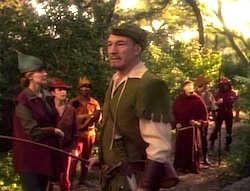Star Trek: The Next Generation Fourth Season
Original air dates: September 1990 June 1991
Executive Producer: Gene Roddenberry
Co-Executive Producers: Rick Berman & Michael Piller
Captain’s Log: The early part of the fourth season seemed to be embracing the theme embodied by the title of the season’s second episode: “Family.” In that episode alone, we are introduced to Picard’s brother, sister-in-law, and nephew, Worf’s human parents, and Crusher’s dead husband/Wes’s father in holographic form. That’s followed by Data’s brother and father (“Brothers“), Yar’s sister (“Legacy“), Worf’s son (“Reunion“), Riker’s wife and son (sorta-kinda, “Future Imperfect“), and O’Brien’s fiancée-then-wife (“Data’s Day“), plus episodes dealing with fatherhood (“Suddenly Human“), the crew as family (“Remember Me“), and the departure of a member of that family (“Final Mission“).
Other themes throughout the season could be considered in orbit of the family one. We get a look at the greater community of the Enterprise from two different angles in “Remember Me” and “Data’s Day.” In the former, we see it via its absence, as Crusher keenly feels the loss of people on the ship. Data’s letter to Bruce Maddox gives us our first in-depth look at the day-to-day existence of the Enterprise crew. People supporting each other happens all over the season—besides the above, there’s the crew rallying ’round Troi when she loses her empathy in “The Loss,” La Forge trying to help his old friends in “Identity Crisis,” the crew helping each other deal with the lack of REM sleep in “Night Terrors,” Data’s friendship with Jenna in “In Theory,” and so on.
Plus there are relationship issues up the kazoo. In “Reunion,” Worf has to deal not only with K’Ehleyr’s return but the unexpected revelation of a son, all tainted by his discommendation (which also remains a recurring theme throughout the season). In “Suddenly Human,” Picard has a surrogate son shoved on him (who then almost kills him), and then he’s embarrassed by both Q and Vash when they put his personal life on display in “Qpid.” The O’Briens go through a cold-feet stage prior to their wedding (“Data’s Day“), and their marriage suffers the occasional growing pain (food in “The Wounded,” hanging plants in “Clues,” jealousy in “Night Terrors,” picking up socks in “In Theory“). Lwaxana (“Half a Life“), Crusher (“The Host“), and Data (“In Theory“) all pursue relationships, and all three find completely unexpected pitfalls.
Finally, the politics of the Alpha Quadrant get a major boost in this season. “Reunion” sets the stage for a potential Klingon-Romulan alliance, which recurs through “The Drumhead,” “The Mind’s Eye,” and “Redemption.” Plus “The Wounded” gives us the Cardassians, a species that will play a major role on this and the next two spinoffs.
Highest-rated Episode: A tie between “Family” and “Reunion,” both of which scored a 10.
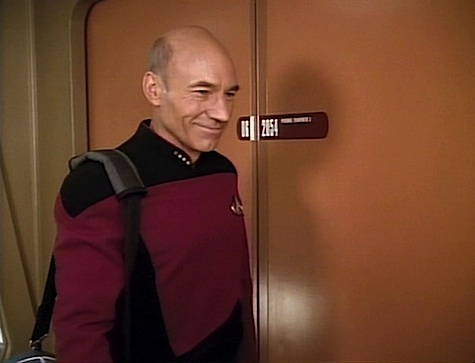
Lowest-rated Episode: Another tie, between “Devil’s Due” and “In Theory.” It seems rehashing (the former of a Phase II script, the latter of “The Dauphin“) isn’t such a hot idea.
Most comments (as of this writing): “Galaxy’s Child” with 41. “The Best of Both Worlds, Part II” was a close second with 38, and would’ve been my guess as top commented upon, but La Forge being creepy prompted lotsa conversation.
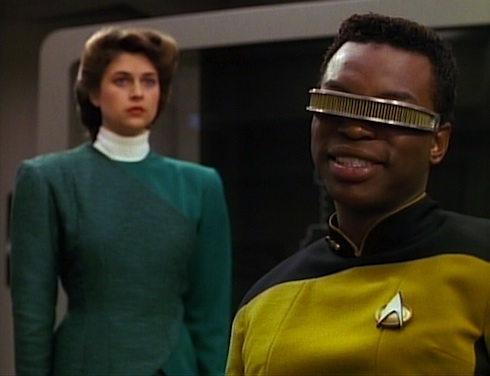
Fewest comments (as of this writing): Yet another tie: “Suddenly Human” and “First Contact” only garnered 16 comments each. Apparently Wes getting splurted in the face with ice cream and Riker having sex with Bebe Neuwirth wasn’t worth talking about much….
Favorite Can’t We Just Reverse the Polarity? From “Identity Crisis“: Crusher and Ogawa determine that the Tarchannen natives undergo mimetic changes under light—but the leap from that to being sensor blind is rather a big one, since sensors are far more all-encompassing than just the visual spectrum. For that matter, it’s never adequately explained how something invisible to sight and to sensors can cast a shadow….
Favorite Thank You, Counselor Obvious: From “Qpid“: For reasons that make no sense whatsoever beyond good old-fashioned sexism, Crusher and Troi are forced to fight in the climactic battle sequence with pots that they break over other people’s heads. To make matters worse, Marina Sirtis and Gates McFadden both have sword training, which is more than can be said for the others (something made abundantly clear by LeVar Burton’s hilariously clumsy fencing). Director Cliff Bole tried to justify it by saying it fit the period, and that he can’t change history, which is bogus on every level, not the least of which being that it isn’t history (and there were plenty of other inaccuracies floating around in terms of costuming and weaponry).
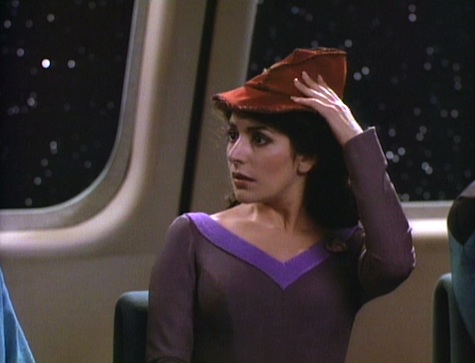
Favorite What Happens On The Holodeck, Stays On The Holodeck: From “Clues“: For some inexplicable reason, Picard talks in a cheesy accent as Dixon Hill, something he’s never done in any of his previous sojourns to 1941 San Francisco (and it really sounds ridiculous).
Favorite No Sex, Please, We’re Starfleet: From “The Wounded“: We see breakfast with the newly wedded O’Briens, as prepared by Keiko: kelp buds, plankton loaf, and sea berries. O’Brien is less than impressed (“I’m not a fish”), and offers to share some of his favorite foods with her, as she’s been doing with him, and makes her a potato casserole that evening (which she has equal trouble with—”What are these dark things?”). It plays as if this is the first time they’ve ever shared meals together, which makes you wonder what they did while they were dating. Their two scenes together feel more like early dates not long after they met, not their first week (or whatever) living together as husband and wife.
Favorite The Boy!? From “Final Mission“: This episode has Wes at his worst, sadly: he’s obnoxious toward Dirgo and the Nenebek, his snotty defending of Picard to Dirgo makes him come across as a whiny teenager, and his sappy conversation with Picard just makes your teeth hurt. Oh, and he saves the day. Again.
Favorite If I Only Had a Brain… From “Devil’s Due“: Data has embraced method acting in an attempt to improve his performances. Picard questions this rather old-fashioned style, but Data feels that immersing himself in the emotions of the characters will help him get one step closer to being human. Picard points out that using his own type of acting rather than simply impersonating others (as he did when he was Henry V) is bringing him a step closer.
Amusingly, when speaking Scrooge’s dialogue, Data uses contractions. Nobody comments on this.
He also makes a dandy judge.
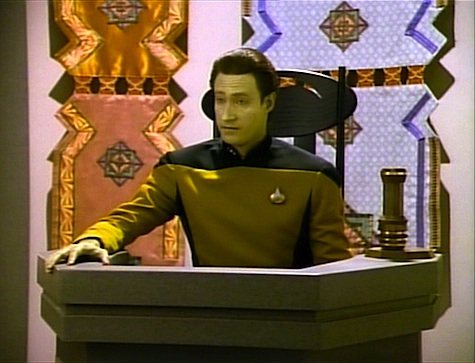
Favorite There is No Honor in Being Pummeled: From “Qpid“: While everyone remembers “I am not a merry man!” Worf’s finest bit in this episode is when he grabs the lute from La Forge’s hands and smashes it into a tree, then hands it back and mutters, “Sorry.” It was a very deliberate tribute to National Lampoon’s Animal House (the only one in Star Trek history), and a true classic moment.
Favorite Syntheholics Anonymous: From “Night Terrors“: When Gillespie starts rabble rousing in Ten-Forward, Guinan tries to calm him to no avail. Eventually, he starts a bar brawl, which Guinan cuts short by firing a really big gun into the ceiling. “That was setting number one. Anyone wanna see setting number two?”
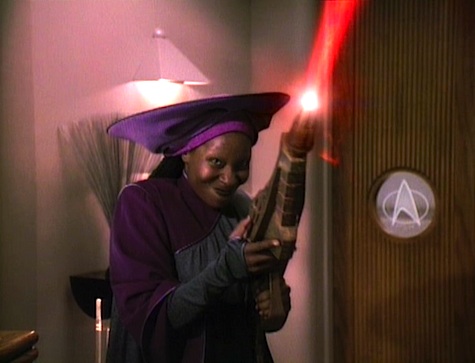
Favorite In the Driver’s Seat: From “The Loss“: Ensign Allenby returns after last week. Given that her position as pilot of a starship requires her to be aware of cosmic phenomena that she might have to navigate around, it makes no sense, none, that she wouldn’t know what a cosmic string was. That’s a spectacular failure of writing, right there. The person at conn is the last person who would stupidly ask, “Cosmic string?”
Favorite Welcome Aboard: Just as the third season was chock full o’ nifty guest stars, so too for the fourth. Marc Alaimo (“The Wounded“) and Michelle Forbes (“Half a Life“) both provided auditions for future roles (as Gul Dukat on Deep Space Nine and Ensign Ro Laren, respectively). As Gowron, Robert O’Reilly introduced one of the franchise’s more memorable recurring characters (“Reunion,” “Redemption“)—ditto Barbara March and Gwynyth Walsh as Lursa and B’Etor (“Redemption“). Rosalind Chao debuted her recurring role as O’Brien’s bride, Keiko (“Data’s Day,” “The Wounded,” etc.). Excellent guest turns were put in by veterans Nick Tate (“Final Mission“), Alan Scarfe (“Data’s Day“), Marta DuBois (“Devil’s Due“), George Coe and Carolyn Seymour (“First Contact“), John Vickery (“Night Terrors“), Maryann Plunkett (“Identity Crisis“), Clive Revill (“Qpid“), Frank Luz (“The Host“), Larry Dobkin and John Fleck (“The Mind’s Eye“), and Michelle Scarabelli (“In Theory“). And nobody ever went wrong casting David Ogden Stiers (“Half a Life“) in anything.
The theme of the season was very much returning guests, though: Elizabeth Dennehy and George Murdock (“The Best of Both Worlds, Part II“), Patrick Massett, Charles Cooper, and Suzie Plakson (“Reunion“), Andreas Katsulas (“Future Imperfect“), Susan Gibney (“Galaxy’s Child“), Dwight Schultz (“The Nth Degree“), John deLancie and Jennifer Hetrick (“Qpid“), Majel Barrett (“Half a Life“), Denise Crosby (“The Mind’s Eye,” “Redemption“), and Tony Todd (“Redemption“) all returned for encores. And mention must be made of Brent Spiner for his trifecta of awesome, playing Lore and Noonien Soong along with Data all in the same room in “Brothers.”
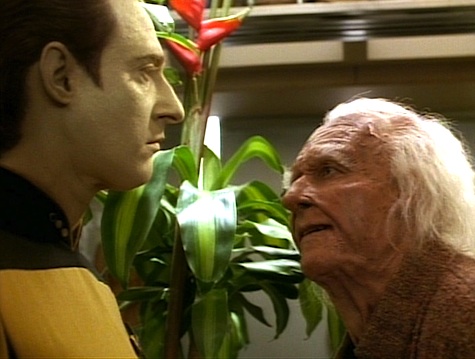
But the winner and champion is “Family,” which gave us four of the best guest stars in the show’s history in the magnificent Jeremy Kemp and Samantha Eggar as Picard’s brother and sister-in-law and the superb Theodore Bikel and Georgia Brown as Worf’s human parents. Four characters who provided so much enlightenment regarding two of the show’s most popular regulars, that episode proved a tour de force of letter-perfect casting.
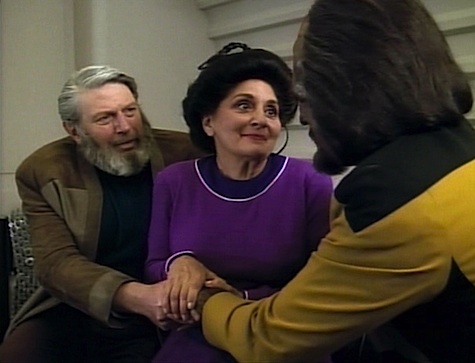
Favorite I Believe I Said That : From “Reunion“: “Not even a bite on the cheek for old time’s sake?”
K’Ehleyr trying to get Worf to come out of his shell.
Favorite Trivial Matter: The one for “Legacy” because, twenty years later, I’m still pissed that they can’t count how many episodes there were.
Make it So: It’s funny, I always thought of this as one of the stronger seasons, yet here I was doing this rewatch and—with obvious exceptions like “Family” and “Reunion” and “Data’s Day” and “The Nth Degree” and “The Mind’s Eye“—I found myself confronted with a lot of mediocre episodes. It began with “The Best of Both Worlds, Part II,” a big let-down after the brilliance of Part 1, with a climax that fizzled, and continued through to a season finale in “Redemption” that didn’t work nearly as well as it should have, for all that it did right, and ended on a sour note.
It’s not that there’s a lot of stinkers in season 4. Even the worst episodes are at best noble failures (“In Theory“—the idea of Data pursuing a relationship is a worthwhile one, it was just botched) and at worst bad episodes with some redeeming features (“Galaxy’s Child“—a nifty science fiction plot overshadowed by La Forge being creepy). But most of the season was a bunch of fair-to-middlin’ episodes that did what they were supposed to do and showcased the cast nicely, but not much beyond that.
That, perhaps, is why the whole of the season works better than the sum of its mediocre parts. This is a strong ensemble, and the strength of that ensemble is on display all over this season. Jonathan Frakes has nicely relaxed into Riker—he’s got some great scenes, from his grumpy snark in “Brothers” to his attempts to bluff his way through “First Contact” to his imitation of Frank Luz in “The Host” to his advice to Data in “In Theory.” Brent Spiner makes the most of his spotlights, from “Brothers” to “Data’s Day” to “In Theory“; ditto Gates McFadden in “Remember Me” and “The Host.” And O’Brien gets more and more time in the sun, getting a full name in “Family,” a wife in “Data’s Day,” and a background in “The Wounded,” and gets to be an integral part of La Forge’s brainwashing in “The Mind’s Eye.” Even Lwaxana Troi gets some depth, as “Half a Life” provides one of the show’s most tragic love stories.
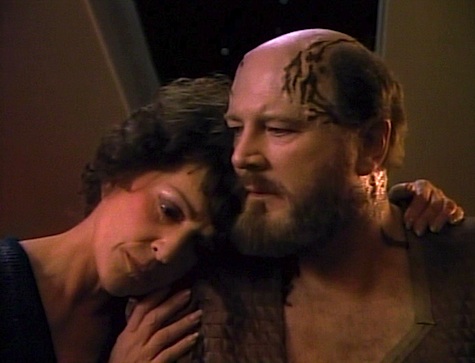
And the fourth season firmly established Worf as one of the show’s breakout characters. Michael Dorn has at this point improved tremendously from the stilted line readings of the first season, and the writing for Worf also has excelled, granting him a complexity few of the other characters are allowed. The mixed emotions of reuniting with his parents in “Family,” tempered by the obvious love he has for them. The turmoil of being reunited with K’Ehleyr and being introduced to the son he never knew he had, then losing K’Ehleyr and his fight with Duras, in “Reunion.” His manipulations in an attempt to regain his family name in “Redemption.” Not to mention his turning into a McCarthyite lunatic in “The Drumhead,” and, of course, “I am not a merry man!“
Not the best season, but far from the worst. One can view each season like a car: each year shifting into the next gear, but by the time you hit fourth gear, you’re coasting down the highway
Warp factor rating for the season: 7
Keith R.A. DeCandido is at Balticon 46 this weekend. If you’re in the Baltimore area, come on over and say hi—and buy his new novel Goblin Precinct, which debuts at a spiffy launch party Sunday at 7 pPM. There’ll be food, music, prizes, and readings—plus, y’know, books!










